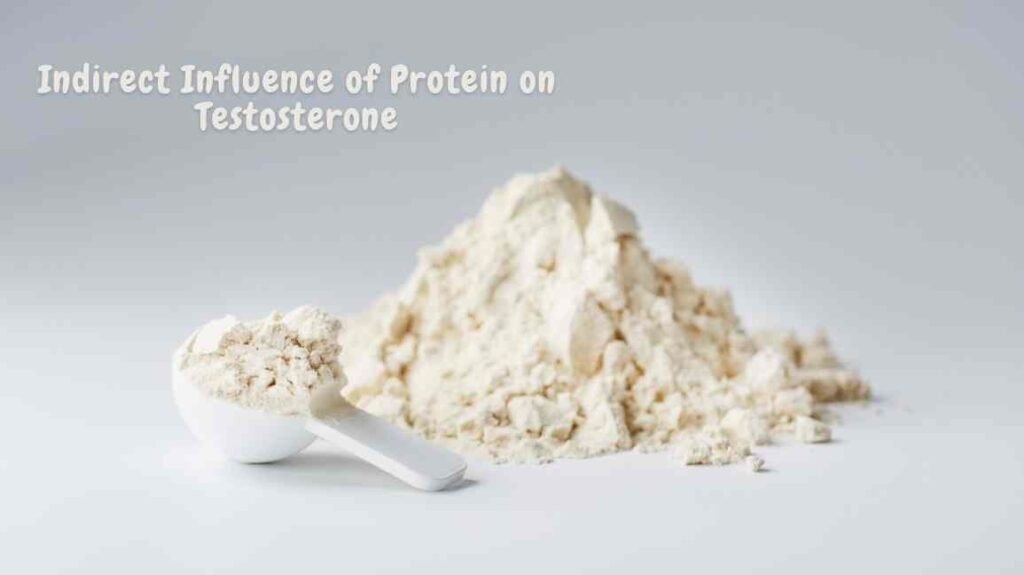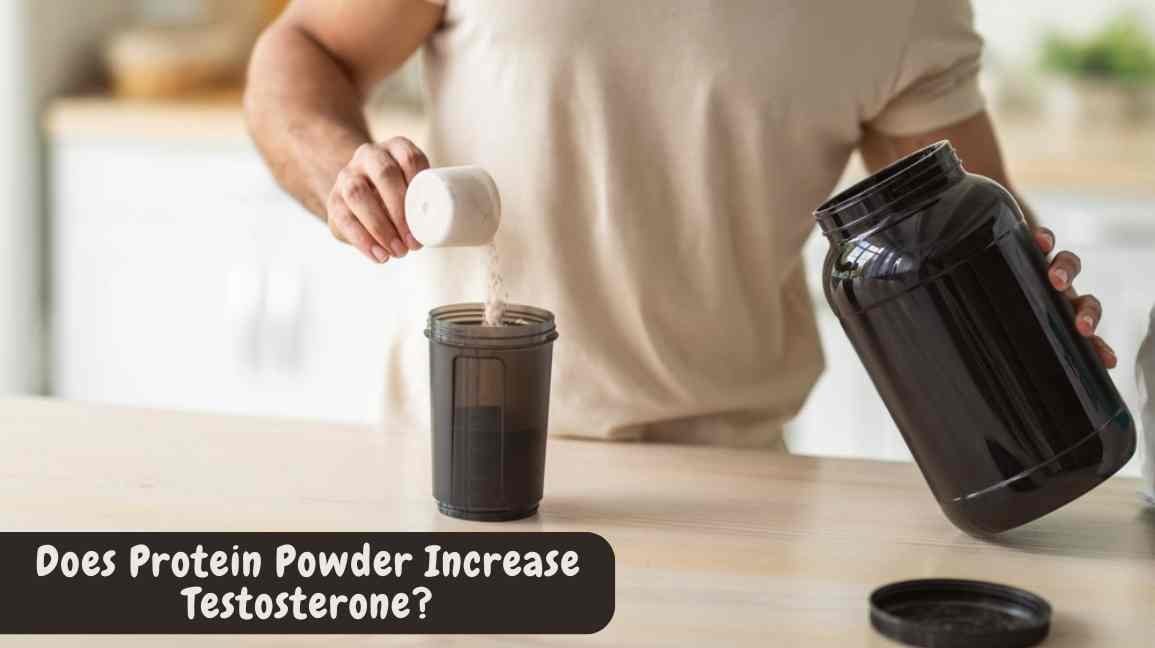Protein powders are healthy supplements that can help build muscle, repair tissue, and create enzymes and hormones. Using protein powder can also help with weight loss and muscle toning.
These powders come from different sources like whey, casein, soy, pea, and hemp, each offering extraordinary advantages and taking care of various dietary necessities and inclinations.
However, there’s a common question about whether protein powder can influence testosterone levels. To address this, it’s essential to understand the relationship between diet, exercise, and hormonal balance.
In today’s article, we will discuss the importance of testosterone, how protein supports muscle repair and growth, and how it indirectly affects testosterone through improved muscle growth, caloric balance, and stress reduction.
What is Testosterone?
Testosterone is a crucial hormone mainly produced in the testes in men and in smaller amounts in the ovaries in women. It plays a vital role in the development of male reproductive tissues, like the testes and prostate, and promotes secondary sexual characteristics like increased muscle and bone mass, and the growth of body hair.
Regulation and Levels of Testosterone
Testosterone levels are controlled by the hypothalamus and the pituitary gland. The hypothalamus sends a hormone called GnRH to the pituitary gland, which then makes a hormone called LH. LH then stimulates the testicles in men and ovaries in women to produce testosterone.
1. Normal Testosterone Levels
Testosterone levels vary significantly by age and sex. In men, normal levels generally range from 300 to 1,000 nanograms per deciliter (ng/dL). For women, the normal range is much lower, typically between 15 and 70 ng/dL.
2. Age-Related Decline in Testosterone
Men experience a natural decrease in testosterone as they age. After the age of 30, testosterone levels generally decline by about 1% each year. This gradual decline can lead to various physical and emotional changes over time.
Functions and Benefits of Testosterone
Sexual Turn of Events and Conceptive Capability:
Testosterone is important for developing male reproductive organs like the testicles and prostate. It also helps with muscle and bone growth and body hair development. Testosterone levels are highest during teenage years and early adulthood, causing changes linked to puberty.
Even in smaller amounts, testosterone helps with sexual desire and keeps muscles and bones strong. It also affects how the ovaries work.
Muscle Mass and Strength:
Testosterone promotes muscle growth. It increases neurotransmitters that encourage tissue growth and interacts with nuclear receptors in DNA, resulting in protein synthesis. This is why testosterone is often linked to physical performance and is sometimes misused in sports for its muscle-building effects.
Bone Thickness:
Testosterone assumes a basic role in bone mineral density. Diminishing levels of testosterone, especially in older men, can lead to weaker bones and conditions such as osteoporosis (a bone disease that occurs when bone mineral density and bone mass decrease, or when the structure and strength of bone change).
Temperament and Mental Capability:
Testosterone has been shown to influence mood and psychological well-being. Low levels of testosterone are associated with symptoms of depression, fatigue, and irritability. On the other hand, sufficient levels are associated with feelings of vitality and well-being.
Fat Distribution:
Testosterone regulates fat distribution in the body. Low levels of testosterone can lead to increased body fat, especially around the abdomen.
Related: Is Ryse Protein Powder Good For You?
Does Protein Powder Increase Testosterone?
No, protein consumption doesn’t influence testosterone levels. The only exceptions are extreme cases: when protein intake is exceptionally low (<0.4g per pound of body weight) or when it’s so high that it causes you to miss out on other essential macronutrients, especially carbs.
Its primary role is to support muscle repair and growth, helping to create an environment conducive to better overall health and potentially improved hormonal balance.
While it is indispensable for muscle repair and development post-workout, it doesn’t directly increase testosterone levels. All things considered, the connection between protein intake and testosterone is more complex and indirect.
Must Read: Is Protein Powder Really Made From Worms?
The Indirect Influence of Protein on Testosterone

- Muscle Development and Exercise: One of the best ways to raise testosterone levels is through regular resistance training. Proper protein intake maintains muscle growth and repair, which is necessary for productive training sessions. In this way, protein indirectly supports an environment that is favorable for increased testosterone production by enabling more effective and consistent training.
- Caloric Equilibrium: Ensuring a proper balance of calories and macronutrients is essential for maintaining optimal hormonal levels. Extreme calorie restriction or starvation can lead to a drop in testosterone levels. Protein powders can help meet daily nutritional needs, especially for those with higher protein requirements or those on calorie-restricted diets.
- Reduced Stress: Excessive training and poor recovery can raise the amount of cortisol, which can negatively impact testosterone levels. Consuming enough protein aids in faster recovery, potentially lowering cortisol levels and promoting better hormonal balance.
Research on Protein Supplements and Testosterone
Several studies have explored the impact of protein supplements on testosterone levels, with mixed results:
- Short-term Study: A few investigations propose that protein supplements don’t fundamentally affect testosterone levels. A review published in the “Journal of the International Society of Sports Nutrition” found no significant changes in testosterone levels in resistance-trained men who consumed protein supplements over a 12-week period.
- Long-term Study: Although the long-term effects are less certain, most researchers agree that protein supplements help with muscle growth and recovery but do not directly raise testosterone levels.
Related: Can I Add Protein Powder to Muffin Mix?
Is it harmful if protein powder increases testosterone?
While protein powder is generally safe and doesn’t typically increase testosterone levels significantly, incorporating it as part of a balanced diet and healthy lifestyle is important.
Its role is primarily to aid muscle repair and growth, which can indirectly support conditions favourable for optimal testosterone production.
Always choose high-quality products and consult with a healthcare professional before starting any new supplement routine, especially if you have concerns about hormone levels or overall health. If you experience any unusual side effects, discontinue use and seek medical advice.
Conclusion
In conclusion, while protein powder is a fundamental supplement for supporting muscle repair and growth, it doesn’t directly increase testosterone levels. The primary way protein powder might impact testosterone is indirectly by supporting muscle recovery and enabling more effective workouts. For optimal testosterone levels, a balanced diet that includes healthy fats, sufficient micronutrients, regular exercise, adequate rest, and stress management is essential.
Protein powder can be a helpful part of this balanced diet, especially for those with higher protein needs or those engaged in regular, intense activity.
FAQ
Does Whey Protein Lower Testosterone?
When you train with high intensity and volume, your testosterone levels briefly increase. This happens whether you’re male or female; the key is pushing yourself hard. Interestingly, this testosterone boost from powerlifting can sometimes be reduced if you consume protein before or after your workout. However, this is not always the case.
To complicate things further, a few studies have shown that high-protein diets can lower resting testosterone levels, while others suggest that increasing protein intake can actually make more testosterone available.
How much protein would it be a good idea for me to consume to help testosterone levels?
The amount of protein required varies based on individual factors such as body weight, activity level, and overall diet. Generally, athletes and active individuals may need more protein to support muscle repair and growth, which indirectly supports hormonal well-being.
Are there other dietary factors that can assist with supporting testosterone?
Indeed, consuming calories rich in healthy fats, nutrients, and minerals, especially Vitamin D and zinc, can support testosterone production. Ensuring a balanced diet and proper nutrition is crucial.
Is protein powder safe for long-term consumption?
Indeed, protein powder is generally safe to consume long-term when used as part of a balanced diet. However, it’s important to choose high-quality products and not rely solely on supplements for your nutritional needs.
Resources
- Feastgood: Does Protein Increase Testosterone [https://feastgood.com/does-protein-increase-testosterone/]
- Pubmed: High-protein diets and testosterone [https://pubmed.ncbi.nlm.nih.gov/36266956/]
Hello Friends!
My name is Ahmad, reading books and gaining knowledge about Health, skin and their conditions is my passion and I am here to share my knowledge and experience with you. I hope it’s very helpful for you.
Thank you very much.
